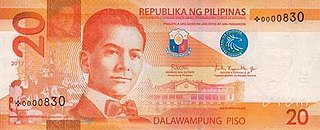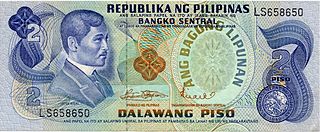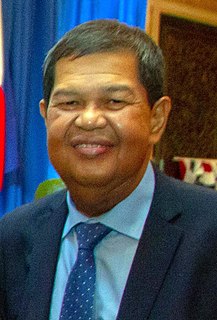
The Philippine peso, also referred to by its Filipino name piso, is the official currency of the Philippines. It is subdivided into 100 centavos or sentimos in Filipino.

Banknotes of the Philippine peso are issued by the Bangko Sentral ng Pilipinas for circulation in the Philippines. The smallest amount of legal tender in wide circulation is ₱20 and the largest is ₱1000. The front side of each banknote features prominent people along with buildings, and events in the country's history while the reverse side depicts landmarks and animals.

Philippine peso coins are issued by the Bangko Sentral ng Pilipinas for circulation in the Philippines and are currently available in seven denominations. The Philippine peso has been in use since Spanish rule.

The Bangko Sentral ng Pilipinas is the central bank of the Philippines. It was established on July 3, 1993, pursuant to the provision of Republic Act 7653 or the New Central Bank Act of 1993 as amended by Republic Act 11211 or the New Central Bank Act of 2019.

BDO Network Bank is the largest rural bank in the Philippines based in Davao City. Established in 2004 through the consolidation of Network Rural Bank of Davao del Sur, the Rural Bank of Panabo of Davao del Norte and the Provident Rural Bank of Cotabato, ONB is the largest rural bank in the Philippines in terms of assets, with a network of 96 branches in Mindanao, 1 branch in Makati and province of Iloilo and a fleet of 135 ATMs throughout the provinces of Mindanao, including seventeen localities where it is the sole provider of financial services.
The New Design Series (NDS) was the name used to refer to banknotes and coins of the Philippine peso issued from 1985 to 1993; it was renamed the BSP Series when the Bangko Sentral ng Pilipinas was established in 1993. It was succeeded by the New Generation Currency (NGC) Series issued on December 16, 2010. The NDS/BSP banknotes were no longer in print and legal tender after December 31, 2015. The coins however, still remain legal tender with the new NGC coins as of 2020.

The Philippine twenty-peso note (₱20) is a denomination of Philippine currency. It is the smallest banknote denomination in general circulation in the Philippines. Philippine president Manuel L. Quezon is currently featured on the front side of the note, while the Banaue Rice Terraces and the palm civet is featured on the reverse side.

The Philippine five hundred-peso note (₱500) is a denomination of Philippine currency. Senator Benigno Aquino Jr. and his wife, President Corazon Aquino are currently featured on the front side of the note, while the Puerto Princesa Subterranean River National Park and the blue-naped parrot are featured on the reverse side.

The Philippine ten-peso note (₱10) was a denomination of Philippine currency. In its latest incarnation, Apolinario Mabini and Andrés Bonifacio are featured on the front side of the notes, while the Barasoain Church and a Blood Compact scene of the Katipuneros are featured on the reverse side. This banknote was circulated until the Bangko Sentral ng Pilipinas stopped printing this denomination in 2002 and was replaced by coins.

The Philippine two-peso note (₱2) was a denomination of Philippine currency. On its final release, José Rizal was featured on the front side of the bill, while the Declaration of the Philippine Independence was featured on the reverse side.
Bank of Commerce, also known as BankCom, is one of the country’s commercial banks and is licensed by the Bangko Sentral ng Pilipinas (BSP). Bank of Commerce is an affiliate of San Miguel Corporation (SMC). Bank of Commerce has a network of 140 Branches and 260 Automated Teller Machines (ATMs) located nationwide, as of December 31, 2020.
Citystate Savings Bank is a publicly listed thrift bank listed in the Philippine Stock Exchange. The bank was a partnership between a group of Filipino businessmen led by Ambassador Antonio Cabangon Chua and a Singaporean investment holding company. It was granted the thrift bank license by the Monetary Board of Bangko Sentral ng Pilipinas in 1997. City State offers banking services, such as deposit products and services, cash management, onsite/offsite ATM facilities, corporate and retail banking, and treasury services. The bank caters to the needs of corporate, middle market and retail clients. The bank operates a total of 24 branches nationwide and employs 276 employees at the end of 2009. As of December 27, 2010, Citystate has a total market capitalization of P2.03 billion and share price of P28.00.
Bank of Makati, Inc. or BMI is a thrift bank established in 1956. It was founded as a rural bank prior to its approval by the Bangko Sentral ng Pilipinas to operate as a thrift bank on 28 April 2015, it officially became a savings bank.

The Governor of the Bangko Sentral ng Pilipinas is the chief executive officer of Bangko Sentral ng Pilipinas, the Philippines' central bank. This position succeeds and replaces the earlier post of Governor of the Central Bank of the Philippines.

Nestor Aldave Espenilla Jr. was a Filipino banker, who served as the fourth governor of the Bangko Sentral ng Pilipinas (BSP) from 2017 until his death in 2019. He began working for the BSP in 1981 and was a deputy governor under his predecessor Amando Tetangco Jr.
The New Generation Currency (NGC) Series is the name used to refer to Philippine peso banknotes issued since 2010 and coins issued since 2018. The series uses the Myriad and Twentieth Century typefaces.
This is a list of commemorative coins issued by the Philippines. More description from the Bangko Sentral ng Pilipinas in this link:
The Center for Agriculture and Rural Development, Inc. is a micro-finance oriented rural bank in the Philippines established in 1997, and is currently regulated by the Bangko Sentral ng Pilipinas. Its main office is located in San Pablo City, Laguna. As of May 2019, Card Bank, Inc. has 750 service offices nationwide.











